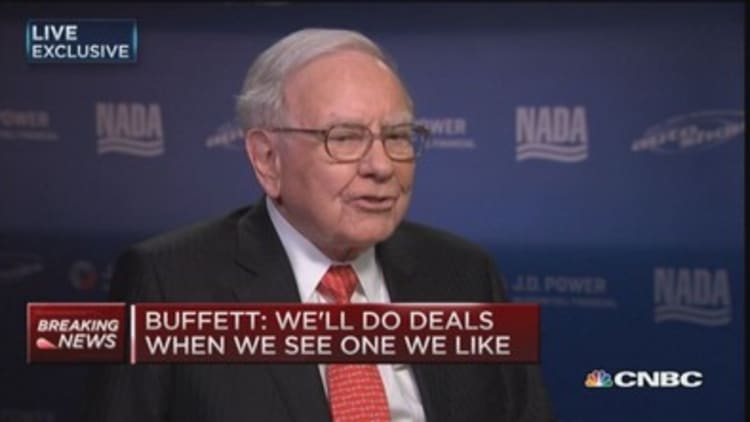Private equity investments have finally slowed, but it's not necessarily permanent.
Despite high profile, multibillion dollar plays like Cerberus Capital Management buying Safeway or BC Partners taking over PetSmart, there were just 668 PE fund investments made in the last quarter in North America, the lowest total since the third quarter of 2011, according to data tracker PitchBook. Those deals totaled $122.2 billion, the lowest amount since the second quarter of 2013.
The story was similar for all PE deals. Global investments hit $207.8 billion in the first quarter, the lowest total since the first quarter of 2013. The number of investments, 1,124, was also the lowest monthly tally since the third quarter of 2010, according to PitchBook.
Read MorePrivate equity investors pile into Africa
Ian Charles, a partner at $15 billion private equity fund specialist Landmark Partners, said the slowdown was temporary.
"As things stabilize we do expect both deal activity and realizations to improve in the second and third quarter," he said.
Charles attributed part of the recent cooling to market volatility last fall. That caused hesitation at PE firms to do deals that would have been finalized in early 2015.
Few bargains
Charles and others also noted that rising markets generally have made it more difficult for fund managers to find attractively priced businesses.
One factor is the strong market for mergers and acquisitions. Companies themselves have plenty of money to invest, which creates competition—and higher prices—for traditional PE fund targets.
"The broader M&A market continues to make life difficult," PitchBook said in a recent note on industry trends.
PE funds have responded by changing how they invest.
Managers are moving away from buying an entire business—a so-called platform buyout. Instead, they are adding investments to existing portfolio companies—an "add-on"—or taking a minority stake in a growing company.
There were 359 platform buyouts in the first quarter, according to PitchBook, the lowest number since the fourth quarter of 2009.
Add-ons include mergers and acquisitions, where a company backed by a PE firm buys acquires another.
A recent blockbuster was the announcement that Kraft Foods Group would combine with H.J. Heinz. Brazilian PE firm 3G Capital bought Heinz with Warren Buffett's Berkshire Hathaway in 2013. The combined firm will go public as part of the deal; Heinz shareholders will own 51 percent of the company following the .
Read MoreBuffett's HJ Heinz to merge with Kraft Foods
"Private equity fund managers are evidently finding greater value in combining portfolio companies within certain sectors, particularly as the global economy begins to stabilize and competition intensifies within specific markets," Christopher Elvin, head of private equity products at Preqin, said in a report Wednesday.

Another reason for continued investments despite relatively high company valuations is simply money to invest.
Private equity funds based in the U.S. had $467 billion in unspent capital as of December, according to the industry association Private Equity Growth Capital Council.
A good time to cash out
The flip side to high valuations is that exits—when a PE firm sells a company or cashes out by taking it public—are relatively easy.
Global PE exits totaled $90.9 billion in the first quarter, down slightly from $124 billion in the first quarter of 2014, but higher than quarterly totals over much of 2011, 2012 and 2013.
The largest exit in the first quarter was the Blackstone Group's sale of a real estate holding, IndCor Properties, to affiliates of GIC for $8.1 billion. GIC is Singapore's sovereign wealth fund.
"It's a very attractive time to be harvesting assets," Landmark's Charles said.






